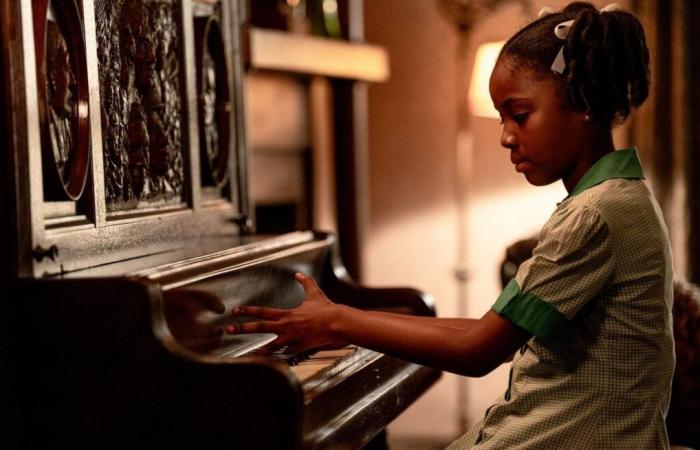In Pittsburgh, in 1936, Berniece lives with her uncle Doaker and raises her daughter, Maretha, alone. But here comes his brother Boy Willie from their native Mississippi. Eager to buy a piece of land, Boy Willie intends to sell the family piano that he and his sister inherited. Berniece is determined not to do anything about it, even if she no longer plays the instrument that sits in the living room. This piano decorated with bas-reliefs is full of the history of theirs.
Produced by Denzel Washington, The Piano Lesson is based on a Pulitzer Prize-winning play by August Wilson. The theme of family is not confined to the plot, since the brothers Malcolm and John David Washington respectively directed and performed it, with, in the production, their illustrious father, Denzel, as well as their sister Katia. Exclusively, we spoke to the first two.
“Reading August Wilson’s play was a fundamentally visual experience for me. I immediately saw the film that I could make from it, with all these metaphysical, spiritual, mystical aspects, and these supporting themes, like family…” remembers Malcolm Washington, who directed his very first feature film there, and that we met at the Toronto International Film Festival earlier this fall.
“The first thing I did was to create this big notebook where I wrote down all the concepts I wanted to address, all my thoughts on Afro-surrealism, black spirituality, Afro history. -American, continues the young director. It wasn’t like “this scene will be like this or like that”, but rather a kind of preview of the atmosphere of the film. Recently, I delved into this book again, and I was surprised to see how close the film is to it. »
For his way of collaborating with his own family in his films, Malcolm Washington says he was inspired by Spike Lee: a model and a mentor. It must be said that Lee is a friend of the Washington family. In fact, over the past 35 years, Denzel Washington and Spike Lee have made five films together: Mo’ Better Blues, Malcolm X, He Got Game, Inside Man et High and Low (forthcoming).
Words, miracles, love
For his part, John David Washington, who defended the role of Boy Willie on stage in 2022, explains that he was struck by the power of August Wilson’s words.
“The lively exchanges between sister and brother, the dynamic between uncles… The family lineage, and how all of these relationships fit into the African-American experience of the South. Slavery…Wilson handles all of this with real grace. In this room, there are miracles, and above all love. Yes, that’s what struck me: the power of words, and then love. »
To pursue the star of Tenet and of The Creator (The creator): “By opening the room as Malcolm did, the film leaves the house: we see the Jim Crow South, we see Mississippi, we see the dreams, the nightmares; we see ghosts, we see fire…”
For the record, The Piano Lesson marks the third time that their father, Denzel Washington, acquired the rights to an August Wilson play in order to bring it to the big screen as a producer, after Ma Rainey’s Black Bottom (The blues of Ma Rainey) et Fenceswhich he also directed and stars in. For this film, however, Dad stepped aside for the benefit of his sons, offering the role of Uncle Doaker, which he could easily have played, to Samuel L. Jackson.
The score for Berniece went to Danielle Deadwyler, incandescent with emotion. For the record, the latter received much praise for her interpretation of Mami Till in the biographical drama Tillin 2022.
“Berniece is the only adult woman in the room,” notes the actress, who was also present during the meeting. “She mothers and protects her daughter, this child who finds herself in the middle of a group of men. »
The relationship to the past
For Danielle Deadwyler, one of the work’s prevalent concerns is not only the past, but the way each character ignores or confronts it.
“We are all confronted with the past,” she believes. Sometimes we try to escape it rather than face it. This is the case for Berniece, even if, paradoxically, she clings to the piano, which is the symbol of the family past. Since she refuses to deal with the past, it comes to torment her, to haunt her, in the form of apparitions. »
Along the same lines, Danielle Deadwyler believes that The Piano Lesson asks good and necessary questions: “How does what has been influence our development as a person? And how do we teach this past to the generations that follow us? This aspect of the play and the film has very current resonances, since black American history is not taught in several American states. This is one of Wilson’s themes that resonates most, I think. »
Of the same opinion, Malcolm Washington adds: “The historical context is interesting, because here is a play written in the 1980s, during the Reagan era, but whose action takes place in the 1930s, during the Great Depression. These two eras each have very historical connotations. And now the adaptation of this play comes out as the United States is once again on the precipice, with this “culture war” raging. It shows how much there is a rhythmic movement to History. »
In this regard, Malcolm Washington says he hopes that this adaptation can act as a balm, even as a binding agent: “Our film is about the reunion of a family, the reunion of a culture: in short, the reunion of people. »
The movie The Piano Lesson releases in theaters on November 8 and on Netflix on November 22.






